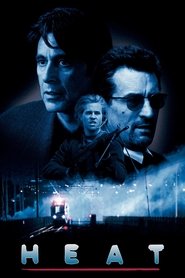See Alex Colville's Pacific for the inspiration for the setup for the 'blue' scene at Pacino, although I'd argue the parallel scene in Mann's Manhunter (1986) is arguably more beautiful.
No convention of the gangster film is more strongly established than this: it is dangerous to be alone. And yet the very conditions of success make it impossible not to be alone, for success is always the establishment of an individual pre-eminence that must be imposed on others[.] The gangster's whole life is an effort to assert himself as an individual, to draw himself out of the crowd, and he always dies because he is an individual; the final bullet thrusts him back, makes him, after all, a failure.
— Robert Warshow: The Gangster as Tragic Hero (1948)
Heat [—] the moment when cop movies became militarized and gallons of bullet casings began to roll through the streets. A metabolization of the Rodney King riots three years earlier, Heat tells us that the specter of policing can no longer be cloaked in the soft fabrics of trench coats and floppy hats.
— Sasha Frere-Jones (Metrograph)
The only thing a Mann man ever does that seems like fun is go to a nightclub, and even then, it is absolutely for work—to make a phone call, to stage a handoff in a backroom, to kill a man. He drinks but never too much. We do not ever see him sleep, but we may see his dreams: icy and perfect visions of the future or the past, of work or what work might yield. Most people agree that Heat (1995) is Mann’s best movie. It’s certainly a turning point for him, a culmination of years of work in which all his stylistic throughways—dreamlike soundscapes, ruthlessly logical plotting, roughneck philosophical reveries—coalesce into something operatic, epochal. No less than three superstar actors get top billing; all play Mann men, Al Pacino in particular responding to the prompt with such over-the-top swagger that he risks rupturing the keening romanticism at the movie’s core.
— Clayton Purdom (Los Angeles Review of Books)
The [opening] shot treats the track lines and the station's contours — pierced from below by a stake-like escalator well — as near-abstract elements. [And] symbolically we might be aware that we are about to watch a film about two characters who run along set rails through the night, unable to deviate.[…]
Having listened to the details of the crime, Pacino moves into his first oration, making big gestures with his arms like some cross between St Peter in Caravaggio's Supper at Emmaus and a traffic cop.
[…]
The film's lack of Waingro, this unknowable force — a serial killer on the side — counterbalances the excess of empathy towards McCautley, whose own morality is at least as sociopathic, if more logical. The irony is that Waingro is the one who really lives his life by McCauley's code, who disposes of domestic attachments with brutality, who has no need to disguise his malignancy on the streets. Waingro exists by pure will. He is a knowing agent of fate, and McCauley's true nemesis.
[…]
It's a symptom of the oppositions that Mann likes to set up that these men who have no time for adjectives and adverbs are regularly confronted by smart women who in turn seem, by some of their phraselogy, [have] read a lot of self-help books. Their language has a parroted quality that goes against the smooth grain of the men's crime-speak[.] The contrast is effective in setting up the usual notion that the sexes speak different languages, but weak in the sense of restricting the scenes with women to a therapeutic ghetto of sensitivity and inaction. [Indeed,] Justine's condemnation of Hanna [at dinner] illustrates the difficulty Mann has with tone every time he reaches out of the genre for a sense of a higher form. He seems desperate to grant some profundity to Justine while keeping her within a generic structure that usually excludes women from bearing too much meaning.
[…]
One brilliant effect of the two actors being shot in exactly the same way but never together is to convey the idea that each is looking into a mirror.
[…]
The gunfight is set in the heart of Downtown, and these men is suits, framed by the fascistic steel and glass towers behind them, seem to be symbols of rampant self-interest. McCauley is now a powerhouse in shades. The images are reminiscent of Robert Longo's 1979-82 high-contrast black-and-white series of figure drawings and relief friezes of buildings, Men in the Cities[.]
[…]
Mann's ability to balance grandeur (of scale) and austerity (of actions) makes one aware of the pleasures of coexisting opposites, of the riches that clash between ambition and genre can lend to the crime drama.
— Nick James: BFI Film Classics: Heat
Synopsis: Obsessive master thief Neil McCauley leads a top-notch crew on various daring heists throughout Los Angeles while determined detective Vincent Hanna pursues him without rest. Each man recognizes and respects the ability and the dedication of the other even though they are aware their cat-and-mouse game may end in violence.

